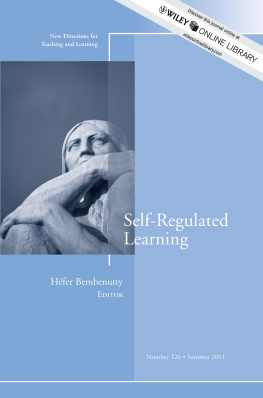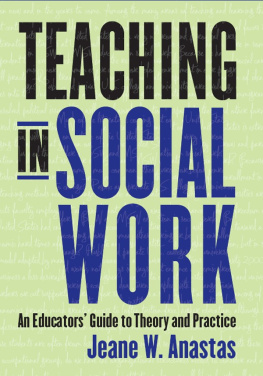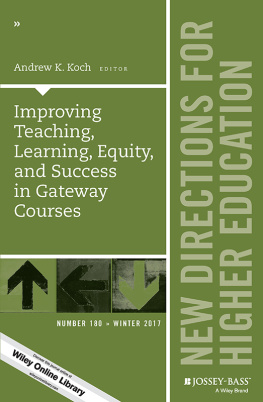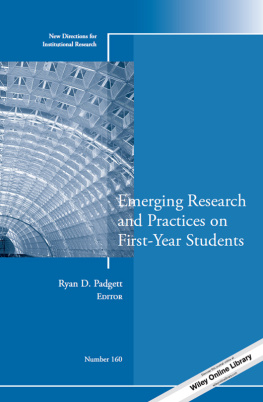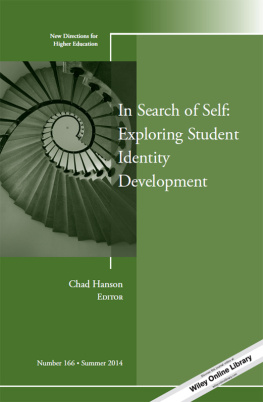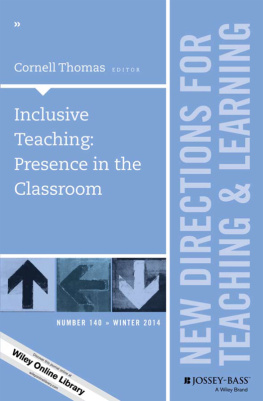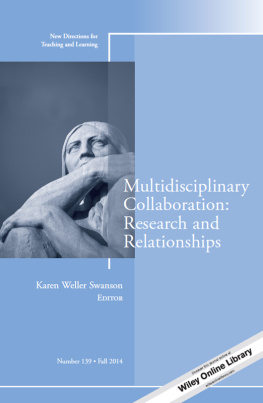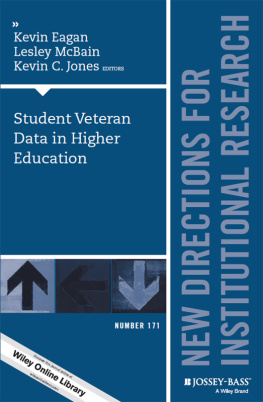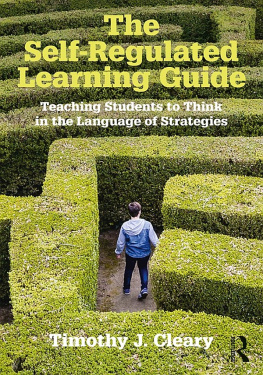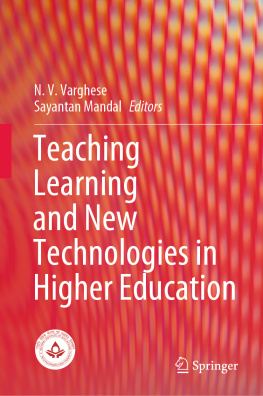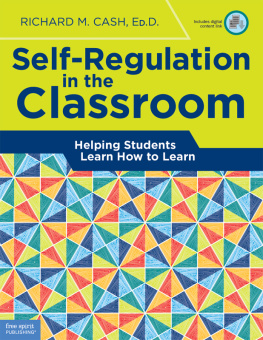SELF-REGULATED LEARNING
Hfer Bembenutty (ed.)
New Directions for Teaching and Learning, no. 126
Catherine M. Wehlburg, Editor-in-Chief
Copyright 2011 Wiley Periodicals, Inc., A Wiley Company. All rights reserved. No part of this publication may be reproduced, stored in a retrieval system, or transmitted in any form or by any means, electronic, mechanical, photocopying, recording, scanning, or otherwise, except as permitted under Section 107 or 108 of the 1976 United States Copyright Act, without either the prior written permission of the Publisher or authorization through payment of the appropriate per-copy fee to the Copyright Clearance Center, 222 Rosewood Drive, Danvers, MA 01923, (978) 750-8400, fax (978) 646-8600. Requests to the Publisher for permission should be addressed to the Permissions Department, c/o John Wiley & Sons, Inc., 111 River St., Hoboken, NJ 07030; (201) 748-8789, fax (201) 748-6326, http://www.wiley.com/go/permissions.
Microfilm copies of issues and articles are available in 16mm and 35mm, as well as microfiche in 105mm, through University Microfilms, Inc., 300 North Zeeb Road, Ann Arbor, MI 48106-1346.
NEW DIRECTIONS FOR TEACHING AND LEARNING (ISSN 0271-0633, electronic ISSN 1536-0768) is part of The Jossey-Bass Higher and Adult Education Series and is published quarterly by Wiley Subscription Services, Inc., A Wiley Company, at Jossey-Bass, 989 Market Street, San Francisco, CA 94103-1741. Periodicals postage paid at San Francisco, CA, and at additional mailing offices. POSTMASTER: Send address changes to New Directions for Teaching and Learning, Jossey-Bass, 989 Market Street, San Francisco, CA 94103-1741.
New Directions for Teaching and Learning is indexed in CIJE: Current Index to Journals in Education (ERIC), Contents Pages in Education (T&F), Current Abstracts (EBSCO), Educational Research Abstracts Online (T&F), ERIC Database (Education Resources Information Center), Higher Education Abstracts (Claremont Graduate University), and SCOPUS (Elsevier).
SUBSCRIPTIONS cost $89 for individuals and $259 for institutions, agencies, and libraries in the United States. Prices subject to change.
EDITORIAL CORRESPONDENCE should be sent to the editor-in-chief, Catherine M. Wehlburg, c.wehlburg@tcu.edu.
www.josseybass.com
ISBN: 978-1-1180-9163-0
ISBN: 978-1-1181-5914-9 (eMobi)
ISBN: 978-1-1181-5915-6 (ePDF)
ISBN: 978-1-1181-5916-3 (ePUB)
From the Series Editor
About This Publication
Since 1980, New Directions for Teaching and Learning ( NDTL ) has brought a unique blend of theory, research, and practice to leaders in postsecondary education. NDTL sourcebooks strive not only for solid substance, but also for timeliness, compactness, and accessibility.
The series has four goals: to inform readers about current and future directions in teaching and learning in postsecondary education, to illuminate the context that shapes these new directions, to illustrate these new directions through examples from real settings, and to propose ways in which these new directions can be incorporated into still other settings.
This publication reflects the view that teaching deserves respect as a high form of scholarship. We believe that significant scholarship is conducted not only by researchers who report results of empirical investigations, but also by practitioners who share disciplinary reflections about teaching. Contributors to NDTL approach questions of teaching and learning as seriously as they approach substantive questions in their own disciplines, and they deal not only with pedagogical issues, but also with the intellectual and social context in which these issues arise. Authors deal on the one hand with theory and research and on the other with practice, and they translate from research and theory to practice and back again.
About This Volume
Self-regulation involves students beliefs about their own potential for actions, thoughts, feelings, and behaviors that will then allow them to work toward their own academic goals. Clearly, the need for self-regulation in higher education is crucial. This volume describes the theories, tools, and techniques that can be used to assist in the promotion of self-regulation in students including areas such as goal orientations, self-efficacy beliefs, social comparisons, self-monitoring, and self-evaluation.
Editor-in-Chief
is the assistant provost for Institutional Effectiveness at Texas Christian University.
Foreword
In the days when behaviorism dominated psychological theory, our actions were thought to be strictly controlled by their consequencesrewards and punishments. As cognitive psychology came into play, the individuals role in making choices in terms of long-term goals and short-term goals became evident. As this volume makes evident, self-regulation of learning to minimize costs in energy expenditure and undesirable consequences is a key factor in the effectiveness of ones activities.
Self-regulation of learning is not a familiar concept to many teachers and college instructors, and even researchers often are ignorant of the body of research and theory that has been built up over the last three or four decades since Banduras seminal contributions. As this volume attests, self-regulation of learning is particularly important in postsecondary education, where students need to master their own learning process, often in the absence of parental or insufficient institutional support. In colleges and universities, students need to be proactive learners by initiating behavioral processes, sustaining positive motivational beliefs, and delaying gratification. In postsecondary education, students need to be in charge of their own learning experiences by seeking help from appropriate sources, socializing with mindful peers, and setting and implementing learning strategies or methods designed to attain academic goals.
As it is evident in this volume, teachers and college instructors can instill in their students the importance of self-regulation for achieving goals by creating programs and by imparting instruction in which the students can engage in strategic planning, develop self-efficacy, sustain intrinsic motivation, and monitor their own academic progress. This volume fills an important gap and provides a convenient resource for teachers, college instructors, and researchers to learn the current state of this important field. Students, too, will find this volume to be an accessible guide to their learning.
is professor emeritus of psychology at the University of Michigan, Ann Arbor. He is a past president of the American Psychological Association (APA), the American Association of Higher Education, the American Psychological Foundation, the Division of Educational Instruction and School Psychology of the International Association of Applied Psychology, and APAs Divisions 2 and 15.
Introduction: Self-Regulation of Learning in Postsecondary Education
The chapter introduces this volume on self-regulation of learning by providing a look at the soundness of the theories, techniques, and tools readily available to instructors and students that could serve to facilitate self-regulation.
Self-regulation of learning occupies a fundamental place in postsecondary education. It is hard to think about the academic success of students in our colleges and universities if the students are not self-directed and self-motivated and cannot sustain cognition, affect, and behavior in order to assist in pursuing their academic and professional goals (Bembenutty, 2009; Schunk and Zimmerman, 2008). Self-regulation of learning refers to learners beliefs about their capability to engage in appropriate actions, thoughts, feelings, and behaviors in order to pursue valuable academic goals while self-monitoring and self-reflecting on their progress toward goal completion (Zimmerman, 2000). The need for self-regulation of students enrolled in postsecondary education institutions is undeniable. Consequently, the focus of this volume on self-regulation of learning is on the specific knowledge that educators and students must acquire in order to secure effective acquisition of skills necessary in our demanding society.

